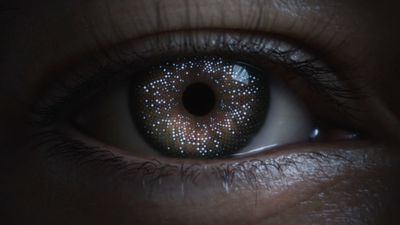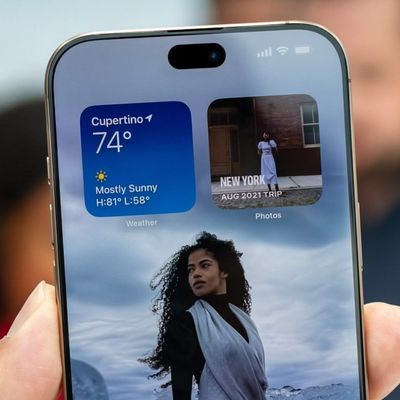Apple's Vision Pro Headset Uses 'Optic ID' Iris Scanning Authentication
The Vision Pro headset that Apple announced today will have a unique biometric authentication method, employing iris scanning for the first time. Optic ID uses cameras in the headset to scan the eye, much like Face ID scans the face.

It is, in fact, almost identical to Face ID, but it uses the unique layout of a person's iris to verify identity.
Optic ID can be used to unlock the headset, authorize purchases, and unlock passwords, much like Face ID and Touch ID. Optic ID data is encrypted, stays on device, and is stored in the Secture Enclave processor so it can never be accessed by Apple or third-party developers.
The headset has numerous privacy features in addition to Optic ID. There is a visual indicator when the on-device camera is being used to record 3D video, and all eye input is isolated so apps and websites aren't able to determine where you're looking. Camera data is processed at the system level, so apps also aren't able to see your surroundings from the multitude of cameras.
Popular Stories
Apple is planning to debut a high-end secondary version of AirPods Pro 3 this year, sitting in the lineup alongside the current model, reports suggest.
Back in September 2025, supply chain analyst Ming-Chi Kuo reported that Apple is planning to introduce a successor to the AirPods Pro 3 in 2026. This would be somewhat unusual since Apple normally waits around three years to make major...
iOS 27 is still many months away, but there are already plenty of rumors about new features that will be included in the software update.
The first beta of iOS 27 will be released during WWDC 2026 in June, and the update should be released to all users with a compatible iPhone in September.
Bloomberg's Mark Gurman said that iOS 27 will be similar to Mac OS X Snow Leopard, in the sense...
Over the last few months, rumors around the iPhone 18 Pro's front-panel design have been conflicted, with some supply-chain leaks pointing to under-display Face ID, reports suggesting a top-left hole-punch camera, and debate over whether the familiar Dynamic Island will shrink, shift, or disappear entirely.
Today, Weibo-based leaker Instant Digital shared new details that appear to clarify the ...
MacBook Pro availability is tightening on Apple's online store, with select configurations facing up to a two-month delivery timeframe in the United States.
A few 14-inch and 16-inch MacBook Pro configurations with an M4 Pro chip are not facing any shipping delay, but estimated delivery dates for many configurations with an M4 Max chip range from February 6 to February 24 or even later. At...
While the iPhone 18 Pro and iPhone 18 Pro Max are not expected to launch for another eight months, there are already plenty of rumors about the devices.
Below, we have recapped 12 features rumored for the iPhone 18 Pro models, as of January 2026:
The same overall design is expected, with 6.3-inch and 6.9-inch display sizes, and a "plateau" housing three rear cameras
Under-screen Face ID...





















